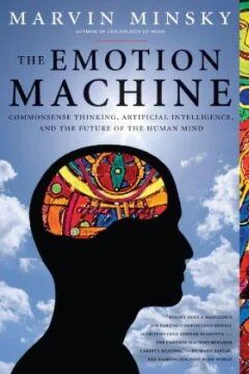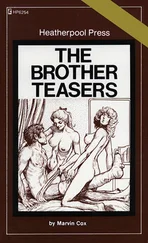A statement without quotation marks is a fictional comment a reader might make.
Citizen: If our everyday thinking is so complex, then why does it seem so straightforward to us?
Most references are conventional bibliographic citations, such as
Schank 1975: Roger C. Schank, Conceptual Information Processing , Elsevier Science Publishers 1975. ISBN: 0444107738.
Some references are to pages on the World Wide Web.
Lenat 1998: Douglas B. Lenat, The Dimensions of Context Space , at http://www.cyc.com/doc/context-space.pdf
Some other references are to newsgroups on the web, such as
McDermott 1992: Drew McDermott. In comp.ai.philosophy, 7 Feb 1992.
To access such newsgroup documents (along with the context in which they were written) one can make a Google search for “comp.ai.philosophy McDermott”. Also I will try to maintain copies of these on my website at www.emotionmachine.net, and invite readers with questions and comments to send them to me by using that web site.
Note this book uses the term resource where my earlier book, The Society of Mind, used agent . I made this change because too many readers assumed that an “agent” is a personlike thing (like a travel agent) that could operate independently, so that mental agents could cooperate in much the same ways that people do. On the contrary, most resources are specialized to [do] certain kinds of jobs for certain other resources, and cannot directly communicate with most of the person’s other resources. For more details about how these two books relate, see the article by Push Singh 2003, who helped to develop many of the ideas in this book.
“Oh, life is a glorious cycle of song,
A medley of extemporanea;
And love is a thing that can never go wrong;
And I am Marie of Roumania.”
— Dorothy Parker
[1] See http://www.english.uiuc.edu/maps/poets/m_r/parker/lightverse.htm
Many people find it absurd to conceive of a person as being a kind of machine —so we often hear statements like this:
Citizen: Of course machines can do useful things. We can make them add up huge columns of numbers or assemble cars in factories. But nothing made of mechanical stuff could ever have genuine feelings like love.
No one finds it surprising these days when we make machines that do logical things, because logic is based on clear, simple rules of the sorts that computers can easily use. But Love by its nature, some people would say, cannot and ought not be explained in such ways! Listen to Pablo Neruda:
“ ...love has to be so,
involving and general,
particular and terrifying,
honoured and yet in mourning,
flowering like the stars,
and measureless as a kiss.”
—from ‘Extravagaria’
What is Love, and how does it work? Is this something we want to understand, or should we see such poems as hints that we don’t really care to probe into it? Hear our friend Charles attempt to describe his latest infatuation.
I’ve just fallen in love with a wonderful person. I scarcely can think about anything else. My sweetheart is unbelievably perfect—of indescribable beauty, flawless character, and incredible intelligence. There is nothing I would not do for her.
On the surface such statements seem positive; they’re all composed of superlatives. But note that there’s something strange about this: most of those phrases of positive praise use syllables like ‘un–’, ‘–less’, and ‘in-’, ‘un-’, ‘-less’, and ‘in-’—which show that they really are negative statements describing the person who’s saying them!
Wonderful. Indescribable,
------ (I can’t figure out what attracts me to her.)
I scarcely can think of anything else.
------ (Most of my mind has stopped working.)
Unbelievably Perfect. Incredible.
------ (No sensible person believes such things.)
She has a Flawless Character.
------(I’ve abandoned my critical faculties.)
There is nothing I would not do for her.
------ (I’ve forsaken most of my usual goals.)
Our friend sees all this as positive. It makes him feel happy and more productive, and relieves his dejection and loneliness. But what if most of those pleasant effects were caused by attempts to defend him from thinking about what his girlfriend says:
Celia: “Oh Charles—a woman needs certain things. She needs to be loved, wanted, cherished, sought after, wooed, flattered, cosseted, pampered. She needs sympathy, affection, devotion, understanding, tenderness, infatuation, adulation, idolatry—that isn’t much to ask, is it Charles?” [2] Barry Took and Marty Feldman, Round the Horne, BBC Radio, 1966
Thus love can make us disregard most defects and deficiencies, and make us deal with blemishes as though they were embellishments—even when, as Shakespeare said, we still may be aware of them:
“WHEN my love swears that she is made of truth,
I do believe her, though I know she lies,
That she might think me some untutor’d youth,
Unskilful in the world’s false forgeries.
Thus vainly thinking that she thinks me young,
Although I know my years be past the best,
I smiling credit her false-speaking tongue,
Outfacing faults in love with love’s ill rest.
But wherefore says my love that she is young?
And wherefore say not I that I am old?
O, love’s best habit is a soothing tongue,
And age, in love, loves not to have years told.
Therefore I’ll lie with love, and love with me,
Since that our faults in love thus smother’d be.”
We are equally apt to deceive ourselves, not only in our personal lives but also when dealing with abstract ideas. There, too, we frequently find ways to keep inconsistent or discordant beliefs. Listen to Richard Feynman’s words:
“That was the beginning and the idea seemed so obvious to me that I fell deeply in love with it. And, like falling in love with a woman, it is only possible if you don’t know too much about her, so you cannot see her faults. The faults will become apparent later, but after the love is strong enough to hold you to her. So, I was held to this theory, in spite of all the difficulties, by my youthful enthusiasm.”
— 1966 Nobel Prize lecture.
What does a lover actually love? That word ought to cover the one you adore—but if your goal is just to extend the pleasure that comes when doubts get suppressed, then you’re only in love with Love itself.
∞∞∞∞∞∞∞∞∞∞∞∞∞∞∞∞∞∞∞∞
Citizen: Your description of ‘love’ in the section above spoke only of transient infatuation—of sexual lust and extravagant passion. It left out most of what we usually mean by that word—such as loyalty and tenderness, or attachment, trust, and companionship.
Indeed, once those short-lived attractions fade, they sometimes go on to be replaced by more enduring relationships, in which we exchange our own interests for those of the persons to whom we’re attached:
Love, n. That disposition or state of feeling with regard to a person which (arising from recognition of attractive qualities, from instincts of natural relationship, or from sympathy) manifests itself in solicitude for the welfare of the object, and usually also in delight in his or her presence and desire for his or her approval; warm affection, attachment.
Читать дальше












